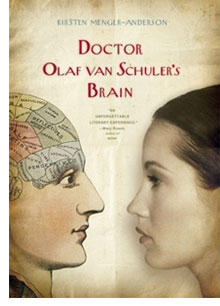 |
 Kirsten Menger-Anderson
Kirsten Menger-Anderson
Doctor Olaf Van Schuler's Brain
Reviewed by: Rick Kleffel
© 2009
Algonquin / Workman
US Hardcover First Edition
ISBN 978-1-56512-561-2
Publication Date: 10-09-2008
290 Pages; $22.95
Date Reviewed: 01-24-2009
Index: General Fiction
Science Fiction
Horror
We're on the cutting edge — and always have been. Unfortunately, that edge cuts both ways, and the certainty of our knowledge can be as or more harmful than that which it seeks to save us from. The doctor who have tried to cure us, and those in their vicinity, have fallen victim as often as they've claimed victory. It's all just a matter of perception. Kirsten Menger-Anderson's book 'Doctor Olaf Van Schuler's Brain' is a collection of linked short stories that offer a very personal and powerful vision of medicine, men, women and history. The focus is tight, but the panorama is grand.
The organization of the book is straightforward but critical to the reading experience. The Table of Contents lists the title of each story with a date; from the title story, which takes place in 1648 to the final story, "The Doctors," which takes place in 2006, the book covers a range of 358 years. That's important to the reader, the stories within and the arc of the book itself. After the Table of Contents, you're going to find "A Genealogical Register of the descendents of Doctor Olaf Van Schuler, from 1640 to the present." Pay attention, because this is one of the most pleasurable aspects of reading this book. Rest assured, you'll be returning to these pages with a smile on your face as they reveal connections within the larger arc of the book. And finally, you get the stories, which unfold in chronological sequence, and hopscotch through the lives of a family of doctors in New York City, sometimes looking at the doctors, others their patients, but always through a lens informed by the medical science of the time.
While the stories in 'Doctor Olaf Van Schuler's Brain' cover wide swathe of time, each story is tightly focused so that we understand the limits of the knowledge of the time in which the story is set. The title story sets the almost elegiac tone of the entire book. Olaf is a recent immigrant with a mother who is clearly mad, and an unhealthy — according to the Church — interest in slicing up the brains of cows and pigs. In a few short pages, Menger-Anderson deftly creates another time, peoples it with characters we understand and care about, and evokes an uplifting, a reach for something not quite there. In the stories that follow, repeats her success but varies her milieu and approach greatly. Sometimes we are in the shoes of a patient's relative ("Happy Effects," a story about the detection of death and the fears of being buried alive), sometimes the patient, ("Neurasthenia: A Victorian Love Story," a striking perception of women's rights and electro-shock therapy), and other times the doctor as patient ("The Doctors," a story set in the present about the unhappy results of Creutzfeldt-Jakob syndrome). In each story, Menger-Anderson perfectly encapsulates a time and a place, characters and events. She also has a fantastic sense of how to end the stories, with a sort of sweeping, headlong, fall upward towards an otherwise ineffable sense of completion. As a short story writer, she's quite accomplished and many of the stories are indeed breathtaking.
Stepping outside the realm of the stories, the book in itself has the feel and sense of a novel. Characters in one story show up in the background of another, and are traceable via the family tree that begins the book. The dates of the stories set each on firmly, and allow the reader and the writer to enjoy the flow of history from one generation to another. The visions of medicine and medical science in all its inadequacy are chock-a-block with facts and perceptions that really open up what we think of science itself. Menger-Anderson's approach evokes the sensibility of Charles Fort when he quipped that, "I conceive of nothing, in religion, science, or philosophy, that is more than the proper thing to wear, for a while." In 'Doctor Olaf Van Schuler's Brain,' the fashions of medical science range from humors and leeches to radium to silicone breast implants. Everything seems like a good idea — at the time.
But Menger-Anderson does more than look at science through the ages. She also looks at women's rights, the arc of American history and the growth of New York City. There are many threads that make this collection of linked short stories much greater than the sum of its parts. 'Doctor Olaf Van Schuler's Brain' is a fascinating, glorious reading experience that will have you questioning everything around you long after you've finished the book. It is the perfect cure for certainty.
|
 |
